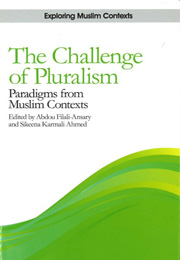Book contents
- Frontmatter
- Contents
- Introduction: Theoretical Approaches to Cultural Diversity
- PART ONE THE HERITAGE: HISTORICAL CONTEXTS
- PART TWO CONTEMPORARY THOUGHT
- 3 Civil Society and Conflict Management: Bangladesh's Experiences
- 4 Pluralism and Liberalism in Contemporary Islamic Thought
- 5 Democracy, Pluralism and Political Islam
- 6 Islam, Conflict and Democracy
- 7 The Diversity of Cultures in the Crucible of Globalisation
- About the Contributors
- Index
4 - Pluralism and Liberalism in Contemporary Islamic Thought
from PART TWO - CONTEMPORARY THOUGHT
Published online by Cambridge University Press: 12 September 2012
- Frontmatter
- Contents
- Introduction: Theoretical Approaches to Cultural Diversity
- PART ONE THE HERITAGE: HISTORICAL CONTEXTS
- PART TWO CONTEMPORARY THOUGHT
- 3 Civil Society and Conflict Management: Bangladesh's Experiences
- 4 Pluralism and Liberalism in Contemporary Islamic Thought
- 5 Democracy, Pluralism and Political Islam
- 6 Islam, Conflict and Democracy
- 7 The Diversity of Cultures in the Crucible of Globalisation
- About the Contributors
- Index
Summary
The Relationship between Islam and Pluralism (or Liberalism)
The inception of cultural debates over liberalism – and I consider pluralism a part of the domain of liberalism – in the Arab world began in the 1960s. Prior to that, debates over issues of modernisation and the relationship with the rest of the world were conducted in terms of secularism or secularism vis-à-vis Islam. This was unfortunate, as the secularism associated with modernisation was the French version, characterised by an uncompromising separation between state and religion. For Muslim thinkers, it is primarily due to this factor that debates on liberalism and Islam contain a great deal of negative residue from debates on secularism and Islam.
For while the process of rejecting secularism continues, Muslim counterattacks included the wholesale rejection of Western values, leading to the absolute rejection of the entire West by Islamists during the 1940s and 1950s. This rejection was caused not only by secularism, but also by major dislocations in the Arab East created by the First and Second World Wars. All these factors were reflected in the transformations of Islamic thought and the emergence of revivalist movements at the time.
Debates about Islam and secularism (modernity and progress) were gradually replaced with debates about Islam and liberalism (modernity, progress and democracy) instigated by the political changes brought about during the Cold War. In terms of political control, neo-revivalist Islamists had not yet become the key players.
- Type
- Chapter
- Information
- The Challenge of PluralismParadigms from Muslim Contexts, pp. 49 - 61Publisher: Edinburgh University PressPrint publication year: 2009



